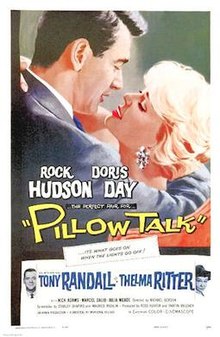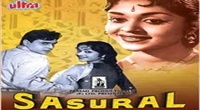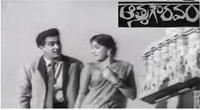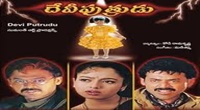Pillow Talk is a 1959 Oscar-winning Eastmancolor romantic comedy film in CinemaScope directed by Michael Gordon. It features Rock Hudson, Doris Day, Tony Randall, Thelma Ritter and Nick Adams. The film was written by Russell Rouse, Maurice Richlin, Stanley Shapiro and Clarence Greene.
| Pillow Talk | |
|---|---|
Theatrical release poster | |
| Directed by | Michael Gordon |
| Produced by | Ross Hunter Martin Melcher |
| Written by | Russell Rouse Maurice Richlin Stanley Shapiro Clarence Greene |
| Starring | Rock Hudson Doris Day Tony Randall Thelma Ritter |
| Music by | Frank De Vol |
| Cinematography | Arthur E. Arling |
| Edited by | Milton Carruth |
Production company | Arwin Productions |
| Distributed by | Universal-International |
Release date |
|
Running time | 102 minutes |
| Country | United States |
| Language | English |
| Box office | $7.6 million (US and Canada rentals) $18,750,000 (Domestic) |
It tells the story of Jan Marrow (Day), an interior decorator and Brad Allen (Hudson), a womanizing composer/bachelor, who share a telephone party line. When she unsuccessfully files a complaint on him for constantly using the line to woo his conquests, Brad decides to take a chance on Jan by masquerading as a Texas rancher, resulting in the two falling in love. The scheme seems to work until Brad's mutual friend and Jan's client Jonathan Forbes (Randall) finds out about this, causing a love triangle in the process.
According to a “Rambling Reporter” (August 28, 1959) item in The Hollywood Reporter, RKO originally bought the script by Russell Rouse and Clarence Greene in 1942, but since it was not produced, the writers bought it back in 1945. In 1947, they sold it as a play, but bought it back once again four years later, finally selling it in 1958 to Arwin Productions, the company owned by Doris Day’s husband, Martin Melcher. Although the film was originally titled Pillow Talk, according to a February 2, 1959 “Rambling Reporter” item in The Hollywood Reporter, the title “displeased” the PCA, and was changed to Any Way the Wind Blows. In August 1959, however, the original title was reinstated.
The film won the Academy Award for Best Original Screenplay, and was nominated for Best Actress in a Leading Role (Doris Day), Best Actress in a Supporting Role (Thelma Ritter), Best Art Direction-Set Decoration, Color (Richard H. Riedel, Russell A. Gausman, Ruby R. Levitt) and Best Music, Scoring of a Dramatic or Comedy Picture.
This is the first of three romantic comedies in which Day, Hudson and Randall starred together, the other two being Lover Come Back (1961) and Send Me No Flowers (1964).
Upon its release, Pillow Talk brought in a then staggering domestic box-office gross of $18,750,000 and gave Rock Hudson's career a comeback after the failure of A Farewell to Arms earlier that year.
On July 14, 1980, Jack Martin reported on Pillow Talk as "biggest hit of 1959".
In 2009, it was entered into the National Film Registry by the Library of Congress for being "culturally, historically or aesthetically" significant and preserved.
Screenplay
Jan Morrow is a successful, self-reliant interior decorator in New York City. She lives alone and claims to be quite happy, when questioned on that subject by her drunken housekeeper, Alma. The only irritant in her life is the party line that she shares with Brad Allen, a talented, creative Broadway composer and playboy who lives in a nearby apartment building. She is unable to obtain a private phone line because the telephone company has been overwhelmed by the recent demand for new phone lines in the area.
Jan and Brad, who have only ever "met" on the telephone, develop a feud over the use of the party line. Brad is constantly using the phone to chat with one young woman after another, singing to each of them an "original" love song supposedly written just for her, though he only changes the name or language he sings in. Jan and Brad bicker over the party line, with Brad suggesting that the single Jan is jealous of his popularity.
One of Jan's clients is millionaire Jonathan Forbes, who repeatedly throws himself at her to no avail. Unknown to Jan, Jonathan is also a Brad's old college buddy and his current Broadway benefactor.
One evening in a nightclub, Brad finally sees Jan dancing and learns who she is. Attracted to her, he fakes a Texan accent and invents a new persona: Rex Stetson, a wealthy Texas rancher. He succeeds in wooing Jan, and the pair begin seeing each other regularly. Jan cannot resist bragging about her new beau on the phone to Brad Allen, while Brad teases Jan by having "Rex" show an interest in effeminate things, thereby implying "Rex's" homosexuality.
When Jonathan finds out about Brad's masquerade, he forces Brad to leave New York City and go to Jonathan's cabin in Connecticut to complete his new songs. Brad invites Jan to join him. Once there, romance blossoms until Jan stumbles upon a copy of "Rex's" sheet music. She plunks the melody on the nearby piano and recognizes Brad's song. She confronts Brad and ignores his attempts at explanation, returning to New York with Jonathan, who has just arrived at the cabin.
Back in New York, Jonathan is pleased to learn that the playboy has finally fallen in love, while conversely Jan will have nothing to do with Brad. Brad turns to Jan's housekeeper, Alma, for advice. Alma, pleased to finally meet Brad after listening in on the party line for so long, suggests he hire Jan to decorate his apartment so they will be forced to collaborate. Jan only concedes so that her employer will not lose the commission. Brad leaves all the design decisions up to Jan, telling her only to design a place that she'd want to live in herself.
Still quite angry, Jan decorates Brad's apartment in the most gaudy and hideous decor she can muster. Horrified by what he finds, Brad angrily storms into Jan's apartment and carries her in her pajamas through the street back to his apartment to explain herself. He tells her of all the changes he's made to end his bachelor lifestyle because he thought they were getting married. Her face lights up and, as he leaves in anger, she uses one of his "playboy" remote control switches to lock the door. She flips the second switch and the player piano pounds out a honky-tonk version of Brad's standard love song. He turns around, their eyes meet, and they lovingly embrace.
At the end of the film, Brad goes to tell Jonathan that he is going to be a father, only to be pulled by Dr. Maxwell (an obstetrician) and Nurse Resnick into their office for an examination, when he says that he’s going to have a baby (a reference to when he ducks into Dr. Maxwell's office in an earlier scene to hide from Jan, but escapes before they can examine him). During the end credits, four pillows appear on the screen—pink, blue, pink, and blue—signifying the children Brad and Jan have together.
- Rock Hudson as Brad Allen
- Doris Day as Jan Morrow
- Tony Randall as Jonathan Forbes
- Thelma Ritter as Alma
- Nick Adams as Tony Walters
- Karen Norris as Miss Dickenson
- Julia Meade as Marie
- Allen Jenkins as Harry
- Marcel Dalio as Mr. Pierot
- Lee Patrick as Mrs. Walters
- Mary McCarty as Nurse Resnick
- Alex Gerry as Dr. Maxwell
- Hayden Rorke as Mr. Conrad
- Valerie Allen as Eileen
- Jacqueline Beer as Yvette
- Arlen Stuart as Tilda
Development
The film’s script was turned down and bought back by RKO a few times in the late 40’s and early 50’s until Martin Melcher (the husband of Doris Day at the time) and his Arwin Productions label bought the script and took it to Universal. According to Day in A.E. Hotchner's autobiography, Doris Day: Her Own Story, the film was initially titled “Pillow Talk,” but the title displeased the Production Code Administration (PCA). Melcher tried to get co-producer Ross Hunter to change the name to Any Way The Wind Blows, the name of a song he was about to publish, but Hunter stuck with the original name. The original ending planned for the film was to have Jan, after using the trick switch to lock the door and then smiling at Brad, shut off the light and say “All apartments look alike in the dark.” This open-ending was changed in the final film to show that Jan and Brad got married and are now expecting a baby.
Casting
The film is noted for reinventing the screen images of Rock Hudson and, particularly, Doris Day. Hunter identified Day's potential to be sexy, and recruited legendary costume designer Jean Louis, who designed 18 or 24 costumes for Day to wear. Hunter said to Day, “You are sexy, Doris, and it’s about time you dealt with it…if you allow me to get Jean Louis to do your clothes, I mean a really sensational wardrobe that will show off that wild fanny of yours, and get some wonderful makeup on you, and chic you up and get a great hairdo that lifts you, why, every secretary and every housewife will say, ‘Look at that-look what Doris has done to herself. Maybe I can do the same thing’.” Day acknowledged that the film transformed her image from "the girl next door" to classy sex symbol, describing that the plot, for the time, was very sexy, involving a climactic scene in which the leading man carries her out of bed in her pajamas and out into the streets. In addition, Laykin et Cie lent $500,000 worth of jewels for Day to wear. This is Hudson's first comedy film, after a slew of dramas that he made throughout the 1950s including All That Heaven Allows (1956) and A Farewell to Arms (1957). It was Hunter who saw Hudson's potential to do comedy. The advice he received from director Michael Gordon was “Comedy is the most serious tragedy in the world. Play it that way and you can’t go wrong. If you ever think of yourself as funny, you haven’t got a chance.” On February 2, 1959, Thelma Ritter was cast as Alma, Jan's housekeeper, while Lee Patrick was cast as Mrs. Walters the following month. Hope Emerson was recruited by Hunter to play an Indian princess called “Dessert Flower” in the film. She does not appear in the final cut. A cameo appearance by Day’s friend and actress Miriam Nelson occurs in the scene where Brad ducks into Dr. Maxwell’s (the obstetrician) office to avoid running into Jan. Nelson was given the walk-on part as a patient in the waiting room so she could have lunch with Day in the commissary.
Filming
According to Rock Hudson, the final scene, in which Brad storms into Jan’s apartment and yanks her out of bed, and carries her through the streets of Manhattan, back to his re-decorated apartment, was actually shot first. Due to back problems, Hudson carried Day on a shelf with her sheets and blankets over her to get through the many takes. According to Hudson, “I could have managed if only one take had been involved, but we went on endlessly, primarily because there was a bit actor who played a cop on the street, and as we passed him Doris’ line was “Officer, arrest this man,” and the cop was supposed to say to me, “How you doing, Brad?” but that stupid actor kept calling me Rock (01:39:36). So back to our marks we went for another take and another and another. I’ll bet we did that scene twenty times. That’s why the shelf for Doris to sit on.” Also, Hudson related that when he pulled Doris Day out of bed, he forgot to let go of her ankles “…with the result that my leading lady crashed to the floor.” Doris Day and Rock Hudson got along and developed chemistry during filming and the cast and crew acted as if they were family. Hudson recalled that, as per a Modern Screen article, “they had to add a week on to the shooting schedule because we could not stop laughing…” Day clarified this during interviews she had with Merv Griffin on The Merv Griffin Show and Johnny Carson on The Tonight Show (1976), during her 1976 press tour to promote her new autobiography, Doris Day: Her Own Story, by A.E. Hotchner. “Every day on the set was a picnic – sometimes too much of a picnic, in that we took turns at breaking each other up.” According to an October 1959 Saturday Review article, Jean Louis designed twenty-four costumes for Doris Day and Laykin et Cie loaned the production $500,000 worth of jewels. The film is notable for its usage of split-screens during which Jan and Brad/Rex have telephone conversations. Triple split-screens are featured at the beginning of the film when Brad is using the party line to flirt with Eileen and Yvette.
Doris Day sings three songs in the film: "Pillow Talk" during the opening credits, "Roly Poly" in the piano bar with Blackwell and Hudson, and "Possess Me" on the drive up to Jonathan's cabin. Singer Perry Blackwell performs three songs in the piano bar: "I Need No Atmosphere", "Roly Poly" (in part), and "You Lied"—a song directed at Hudson's character, Brad. Hudson sings "Inspiration" in the film to three of his conquests: Eileen, Yvette and Marie. It then becomes an instrumental motif to represent Brad and his playboy ways: when the telephone inspector comes to interview Brad (00:13:24), when Brad calls Jan to apologize for his behavior and ask her on a date (00:26:26) and when Jan realizes that "Rex" was Brad the whole time after discovering the sheet music of the song and playing its notes on the piano in Jonathan's home during their stay in Connecticut (01:17:54). For their commercial releases, Doris Day recorded the title song for Columbia Records and Rock Hudson recorded "Roly Poly" and the title song for Decca Records.
 Story of movie Pillow Talk Film :
Story of movie Pillow Talk Film : 




.jpg)
.jpg)
.jpg)
.jpg)

.jpg)










